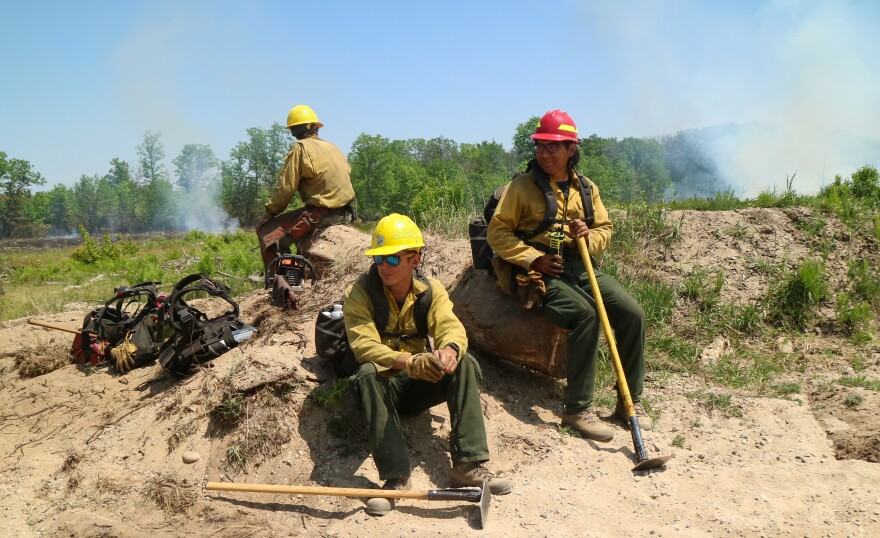Federal wildland firefighters in Michigan are calling on Congress to not let their paychecks fall off a cliff by the end of the fiscal year on Sept. 30.
For the past two years, a provision in the Bipartisan Infrastructure Law has providrf U.S. Forest Service firefighters a base salary of $20,000 or an amount equal to 50% of their base salary.
But this is on schedule to expire at the start of the new fiscal year unless Congress passes the Wildland Firefighter Paycheck Protection Act of 2023 introduced last week in the Senate committee on Homeland Security and Government Affairs, chaired by Michigan Senator Gary Peters.
The bill also provides additional time to rest and recover after wildland firefighters respond to large fires, premium incident response pay and a new pay scale for all wildland firefighters.
One Michigan firefighter told WCMU he’s worried dramatic pay cuts will lead to mass resignations and retirements in a work force that’s already struggling to fill open positions.
“We are thinking a 30-50% resignation rate” if the Wildland Firefighter Paycheck Protection Act doesn’t pass, said Warner Vanderheuel, general vice president of the National Federation of Federal Employees Forest Service Council on a phone call with WCMU.
“I can't imagine starting out in this career last year and getting that pay supplement. And then, oh, by the way, we're cutting your pay by $600 a week starting tomorrow. I don't know if they'll stay around.”
Vanderheuel said there’s a 25% vacancy rate for firefighters in the Forest Service and that most of these firefighters are seasonal workers and paid by the hour.
During fire season, which is typically begins after snow melts and lasts six months, wildland firefighters can work the equivalent of a year’s worth of hours.
This is largely due to overtime hours, said Vanderheuel. Wildland firefighters are often deployed across the country to assist areas with large fires.
On June 3, over 2,000 acres of forest burned near Grayling in addition to nearly 100 acres at the Huron-Manistee National Forest in Iosco county. According to Vanderheuel, those fires started ten minutes a part. Dozens of wildland firefighters from as far west as Oregon flocked to Michigan to aid in the response to both fires.
Vanderheuel said the peak of fire season traditionally slows in June, but "June this year was the busiest I've ever seen it."
“Wildland firefighters in Michigan have worked tirelessly to defend homes, businesses and residents from raging wildfires,” said Senator Peters in an email to WCMU.
“This bipartisan bill will ensure these brave first responders get the compensation they deserve for putting their lives on the line to protect our communities – and I will work to make sure it passes my committee as soon as possible.”
Michigan is home to three National Forests: Huron-Manistee, Hiawatha and Ottawa. There are roughly 100 wildland firefighters currently serving these forests, according to Vanderheuel, who’s based in Oscoda.
Vanderheuel added the U.S. Forest Service has been sending resources to Canada as wildfires continue to rage at a record-setting pace across the country and caused air-quality alerts across Michigan.
Michigan’s Forest Service firefighters haven’t contributed significant resources to wildfires in Canada, but that could change, according to Vanderheul.
This is due to the National Interagency Fire Center projecting Michigan to remain “above normal” for significant wildland fire potential through September.
“It's just a giant chess game of how you move resources around,” said Vanderheul.


